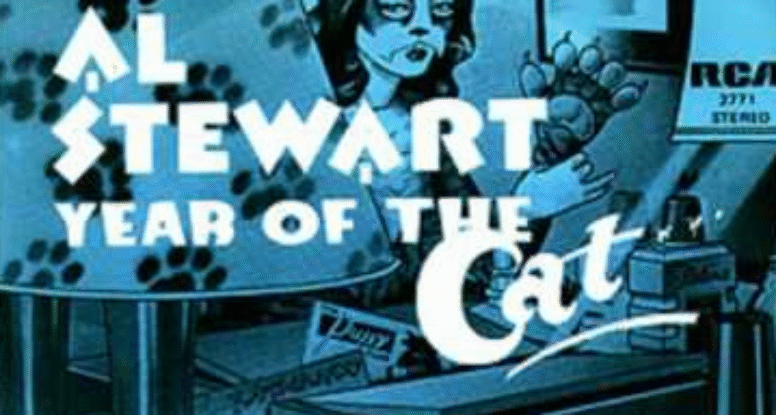
Metaphor in Al Stewart’s The Year of the Cat
When I started gaining traction as a writer, I found myself stumped by interview questions about my literary influences. It’s easy to list off obvious authors who, due to fame, spring readily to mind and consequently influenced everyone about equally. It’s much harder to say something meaningful about the more obscure influences who made me who I am–personally–and then faded into the shadows of time. Recently on a lark, I asked my car to play Al Stewart’s “The Year of the Cat,” and was reminded that this was one of those obscure inspirations that moved me as a kid, long before any literary aspiration had taken hold.
The reason, I decided, is the peculiarly vivid, yet descriptively ambiguous metaphor with which he filled the song. From the pianissimo opening to the bass thumping conclusion, Stewart’s “The Year of the Cat” weaves a tapestry of dreamlike imagery and poetic metaphor that conjures emotion more than literal meaning. The song is rich in explicitly stated metaphors that sound vivid and cinematic, yet resist straightforward interpretation.
“She comes out of the sun in a silk dress running like a watercolor in the rain”
This is perhaps the most famous and evocative metaphor in the song. A watercolor “running in the rain” suggests softness, beauty, but also transience and dissolution. The woman described is dazzling, luminous, and ephemeral—her presence is momentary and fragile, impossible to pin down. The image evokes both allure and inevitable loss. She’s not walking, not floating—she’s running, and her form is blurring. This metaphor isn’t meant to describe her literally, but to imprint a sensory experience of her ethereal, fleeting nature.
“She looks at you so coolly, and her eyes shine like the moon in the sea”
Fits the same mode—using natural imagery (moonlight on water) to convey emotional tone. The woman’s gaze is both detached (“coolly”) and luminous. It reinforces her mysterious allure, further separating her from the ordinary or mundane.
“You go strolling through the crowd like Peter Lorre contemplating a crime”
This is a more unusual and almost jarring metaphor. Peter Lorre was known for playing sinister, troubled, or mentally unhinged characters—his presence in films like M or The Maltese Falcon is twitchy and tense. The image conjures a sense of unease, detachment, or internal tension. The line doesn’t say what crime or what the protagonist is thinking—it only borrows the mood and shadow of Lorre’s onscreen persona. It contributes to the song’s noir atmosphere, making the character seem like a man walking through his own moral fog.
“She comes out of the sun in a silk dress / Running like a river in the year of the cat”
This final line loops back to the chorus. “Running like a river” gives a feeling of unstoppable motion—fluid, natural, maybe fated. A river doesn’t choose its course; it follows gravity, bends to the landscape, and ultimately reaches the sea. Paired with “the year of the cat”—a reference to Vietnamese astrology (analogous to the Chinese year of the rabbit), often associated with sensuality, charm, and unpredictability—it gives the metaphor mythic or astrological weight. The woman is both natural and cosmic, and the man is caught up in her current.
These metaphors do not clarify—they mystify. Their function is not to define the woman or the events in literal terms, but to saturate the scene in tone, mood, and emotional suggestion. Each one deepens the sense that the protagonist is being swept away by something larger, stranger, and more beautiful than he understands. I’m reminded of an interview with Bernie Taupin in which he said Elton John’s lyrics were intentionally ambiguous, and that’s why they were hits. They let the listener hear a song about whatever speaks to them personally. Stewart’s metaphors are cinematic—like frames from a film noir or an impressionist painting—and that’s no accident: the song begins with “On a morning from a Bogart movie.” It’s art about being inside art, romance caught in unreality. The explicitly stated metaphors deliberately trade specificity for resonance and are meant to be felt more than understood. To be sure, they strike me today far differently than they did that boy laying in bed with a transistor radio, tuning in the world, dreaming of the romance of a life yet to come.
I sometimes lament I cannot get away in prose with some of the more beautiful and effective artistry of the song stylist. But this is one of the songs that long ago planted the seed that I should try.
Go Boldly!
